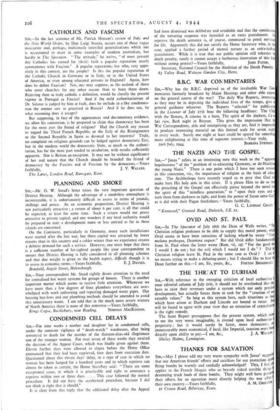CATHOLICS AND FASCISM
Sts,—In the last sentence of Mr. Patrick Henson's review of Italy and the New World Order, by Don Luigi Sturzo, occurs one of those vague inaccurate and, perhaps, maliciously intended generalisations which one is accustomed to meet in some examples of modern journalism, but hardly in The Spectator. " The attitude," he writes, " of most present day Catholics has earned for (their) faith a popular reputation nearly synonymous with Fascism." A popular reputation; but who, very appo- sitely in this context, are the people? Is this the popular reputation of the Catholic Church in Germany or in Italy, or in the United States of America, or even among educated persons in England? Again, how does he define Fascism? Not, one may suppose, as the outlook of those who enter churches for any other reason than to burn them down. Rejecting then so truly catholic a definition, would he classify the present regime in Portugal as Fascist? And if the mild authoritarianism of Dr. Salazar is judged by him at fault, does he include in a like condemna- tion the sterner sort as practised in Russia? And if he does not, by what reasoning does it escape?
But supposing, in face of the appearances and documentary evidence, we allow his contention, is he prepared to claim that democracy has been for the most part the friend of religion? Had the Church any reason to regard the Third French Republic or the Italy of the Risorgimento or the Second Republic in Spain as devoted to her interests? Truly, no complaint on religious grounds can be lodged against democratic Eire, but in the modern world the democratic State, as much as the authori- tarian, has for the most part tended to secularism, with results sufficiently apparent. Nor is Britain an exception. It may not be without significance of her real nature that the Church should be branded the friend of democracy by the Fascists and of Fascism by the democrats.—Yours


























 Previous page
Previous page